- Theodor Leschetizky
- NYPO
- Gene Gutchë
- Champs Hill
- Anshel Brusilow
- Republic of Sierra Leone
- Desmond Ratcliffe
- Åke Oskar Verner Hermanson
 SPONSORED: Ensemble. A view from the pit - John Joubert's Jane Eyre, praised by Alice McVeigh.
SPONSORED: Ensemble. A view from the pit - John Joubert's Jane Eyre, praised by Alice McVeigh.
All sponsored features >>
 DISCUSSION: What is a work? John Dante Prevedini leads a discussion about The performing artist as co-creator, including contributions from Halida Dinova, Yekaterina Lebedeva, Béla Hartmann, David Arditti and Stephen Francis Vasta.
DISCUSSION: What is a work? John Dante Prevedini leads a discussion about The performing artist as co-creator, including contributions from Halida Dinova, Yekaterina Lebedeva, Béla Hartmann, David Arditti and Stephen Francis Vasta.
Spirituality and Revolution
GIUSEPPE PENNISI reports from Rome on Francis Poulenc's 'Dialogues des Carmélites'
On 27 November 2022, I was in a crowded theater, for the inauguration of the 2022-2023 season of Teatro dell'Opera di Roma with Dialogues des Carmélites by Francis Poulenc. In Rome, the work had been missing since 1991, when a superb production was presented at Teatro dell'Opera (directed by Alberto Fassini, sets and costumes by Pasquale Grossi, musical direction by Jan Latham Koenig and a stellar cast), subsequently revived in Cagliari, Catania and Trieste. I was lucky enough to see and hear the opera not only in Rome but in productions by John Dexter at the Metropolitan Opera in New York in 1980 and in that by Robert Carsen (with Muti on the podium) in 2004 at the Teatro degli Arcimboldi, where La Scala was staging during the long years of restoration of Piermarini Hall. Also noteworthy is the version of pieces of the opera in concert form at the Accademia Nazionale di Santa Cecilia in 2014, with the concertation of Stéphane Denève as well as the Teatro Comunale di Bologna production I saw and reviewed in this magazine in 2019.
Other works by Poulenc, such as La voix humaine and Les mammelles de Tirésias, may be considered more innovative, but both his Stabat Mater and Dialogues des Carmélites mark the composer's desire to give the best of himself on his return to the Faith. The plot is well known: it concerns the guillotining of sixteen Carmelites in Revolution Square (now Place de la Concorde) ten days before the end of the terror. This is a true story handed down by one of the sisters who, by chance - she was in the ministries struggling with bureaucratic practices - was not arrested: a sign of the Lord's will to keep her alive to witness the martyrdom of the others. Commissioned by the publisher Ricordi for the Teatro alla Scala, it debuted in its Italian version on 26 January 1957 - the date on which La Scala seasons then opened.
The first performance in French was at the Opéra six months later. In the following twelve months, there were performances in London, Vienna and the United States (as well as in France and in Italian theaters). Initially, Poulenc's work on a text by Georges Bernanos was conceived as a screenplay for a film. It was derived from an episode that actually happened in 1794 (as well as from the 1931 German novel Die Letze am Schafott, The Last at the Gallows, by Gertrude von Le Fort). It deals with a group of nuns who go to the guillotine in front of the Jacobin tribunal rather than abjure their deepest ideas. The story also had political intentions - the freedom of the Faith in the face of pressing Nazism. Georges Bernanos made a successful stage drama and the screenplay for a film.
Poulenc's opera is based on the script for the film: rapid scenes that follow one another in the three acts. (Originally, there should have been two.) The film was made in 1960 and directed by Raymond Léopold Bruckberg and Philippe Agostini with Jeanne Moreau (among the performers) and André Bac (for photography). In Italy, the film does not return to theaters or even to television. Poulenc's work is often on the billboard in the USA, Germany and France.
It is a work almost entirely for womens' voices even if it requires a strong lyric tenor and a baritone in the main roles (and many male voices in the secondary ones). Among the female voices, dominate an 'absolute' soprano (the protagonist Blanche), a coloratura soprano (Constance), a mezzo/contralto (the old Prioress), and a mezzo (Marie).
While Gertrude von Le Fort's novel was read in Germany as a denunciation of the intolerance of both creeping Nazism and Bolcevism prevailing in the Soviet Union, Georges Bernanos' screenplay emphasized the Catholic faith as a barrier against Jacobinisms. In her book Francis Poulenc - Una Biografia (Zecchini Editore, 320 pages, €23), Stefania Franceschini recalls that the composer was famous both as a highly acclaimed pianist and for his light and smiling spirit like ballets such as Les biches (conceived for Monte Carlo) and Les Fêtes Galantes or for surrealist works such as Les mammelles de Tirésias or for monodramas on sensuality (La voix humaine) and eros (Le Bel Indifférent).
The death of a close friend, the Second World War and a pilgrimage brought Poulenc back to the Catholic Faith that he had abandoned in his youth. The opera Dialogues des Carmélites was his first major opera in three acts and with numerous characters. It was one of his last works too. It is a 'modern' but not 'contemporary' work as it is close to traditional Italian musical theater and not to the stylistic features in fashion in 1957. The score is strictly tonal and - as Poulenc himself said - is influenced by Debussy, Verdi, Mussorgsky, Stravinsky and Monteverdi. The recitatives seem to be based on Pelléas et Mélisande and L'Incoronazione di Poppea, and the choruses and great epic moments echo Don Carlo and Boris Godunov. In the orchestration, there are references to Stravinsky. The work requires a huge, almost Mahlerian orchestra (with a triple endowment of winds, two harps, piano and also a guillotine).
Sixty years have gone by since the opera's first performance. In recent years, beyond the intentions of the creators, the work has been the subject of conflicting readings. There are those who have approved it as a healthy alternative to the harshness of the avant-garde and those who criticize it as a conservative score. The same subject, depending on the point of view, has been exalted as a condemnation of the French Revolution and its excesses, or denigrated as reactionary. The passage of time has demonstrated the sterility of these controversies and allows us today to overcome them: both Bernanos' text and Poulenc's music are now recognized universally as the pinnacles of twentieth-century musical theater.
On 27 November, Michele Mariotti was an excellent conductor of the superb Rome Teatro dell'Opera orchestra. With this opera, he debuts in his new role as musical director of the Rome Teatro dell'Opera. He is best known as a Rossini and Verdi conductor, but I remember, about ten years ago, in Modena his masterful conducting of Il Prigioniero by Luigi Dallapiccola, one of the summits of twentieth-century musical theater. Mariotti captures the nuances of Dialogues, the inner dramas of the individual protagonists and the climate of terror in the last months of the French Revolution. He gives 'the attacks' to the numerous singers. He received ovations before the start of the second part and as curtains fell.
The stage direction by Emma Dante refers to the Carmelites before taking vows: 'Those who, like the Carmelites, decided to devote their lives to sacrifice, renouncing material goods, practicing penance and abstinence from earthly pleasures, at the beginning of everything - she says - were women, sensual, curious, lovers of beauty and lightheartedness.' I do not agree fully with this reading because it misses the strong spirituality and I found it preposterous to see the Carmelites leaving the convent, bicycle riding. However, the audience applauded Emma Dante warmly at the end of the performance. The effective scene sets are by Carmine Maringola, the costumes by Vanessa Sannino, the lighting by Cristian Zucaro and the choreographic movements by Sandro Campagna.
Let's go to the voices. The protagonist in the role of Blanche de la Force is the American soprano Corinne Winters, who in Rome was an unforgettable interpreter of Madama Butterfly and Kát'a Kabanová, fresh from a resounding personal success at the last Salzburg Festival in Janáček's masterpiece. She is a true absolute soprano (and a great actress) who perfectly expresses the torments and uncertainties of Blanche until the decision to be 'the last to the gallows'.
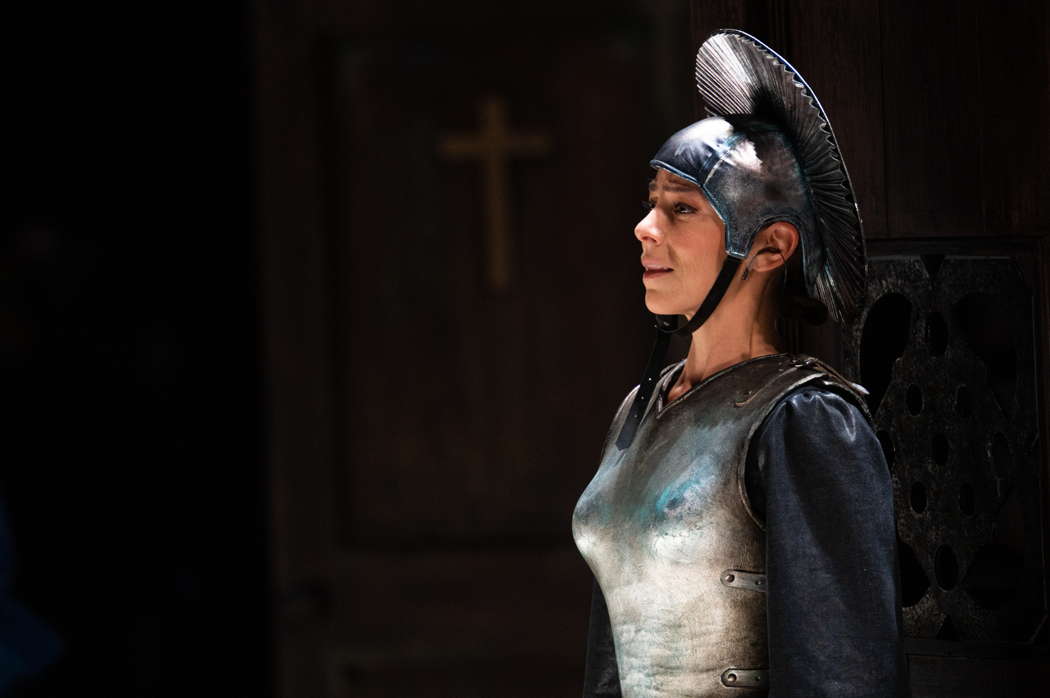
Corinne Winters as Blanche in Opera di Roma's production of Poulenc's Dialogues des Carmelites. Photo © 2022 Fabrizio Sansoni
Next to her, Anna Caterina Antonacci, who with conductor Michele Mariotti and stage director Emma Dante was the protagonist of Poulenc's La voix humaine in Bologna, in the role of Madame de Croissy. She is also an 'absolute soprano' with great interpretative skills: over the years, the voice has become darker and she is perfectly at ease in a role sometimes entrusted to a mezzo soprano.
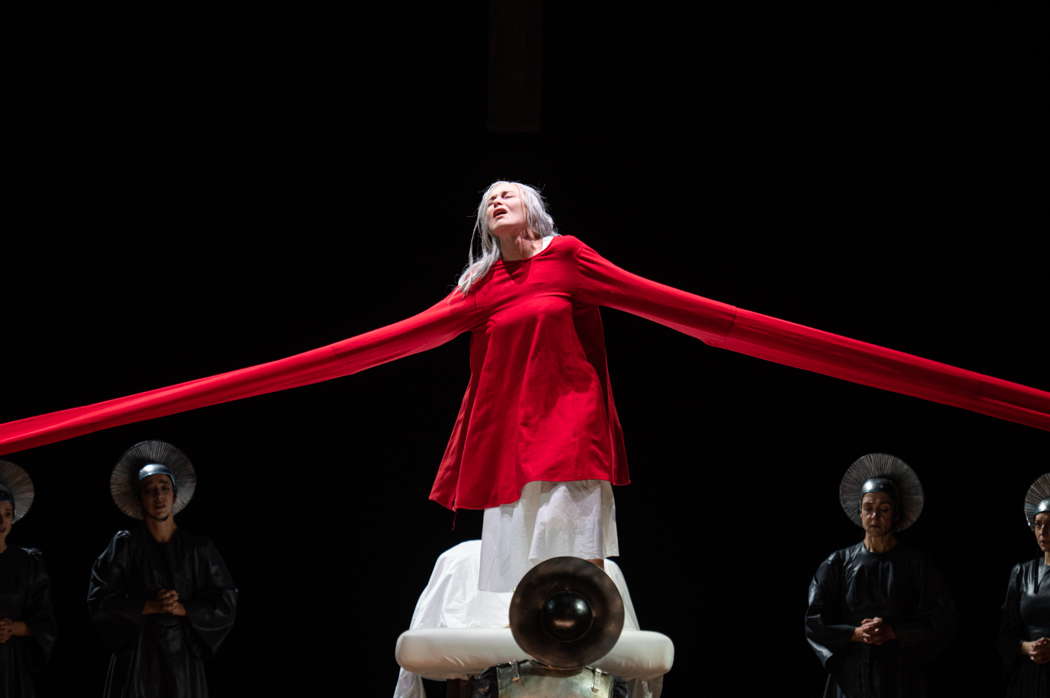
Anna Caterina Antonacci as Madame de Croissy in Opera di Roma's production of Poulenc's Dialogues des Carmelites. Photo © 2022 Fabrizio Sansoni
Ewa Vesin as Madame Lidoine is a dramatic soprano who at the Teatro dell'Opera di Roma was appreciated in 2019 as the protagonist of Prokofiev's The Fiery Angel.
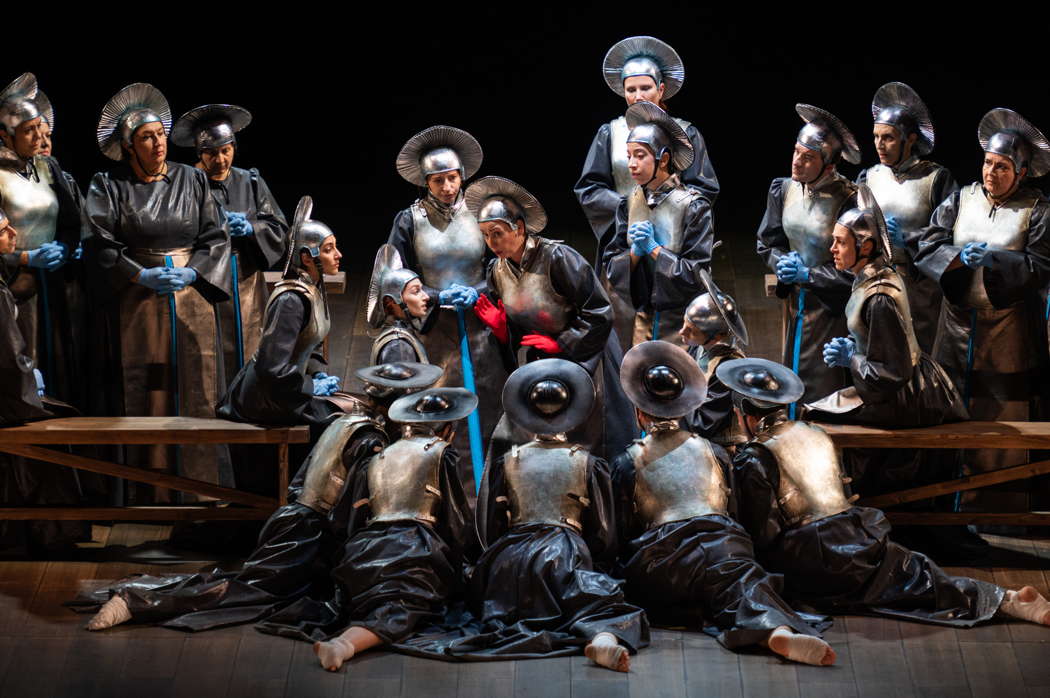
Ewa Vesin as Madame Lidoine in Opera di Roma's production of Poulenc's Dialogues des Carmelites. Photo © 2022 Fabrizio Sansoni
Ekaterina Gubanova, a Russian mezzo soprano, interprets with passion, Mère Marie de l'Incarnation.
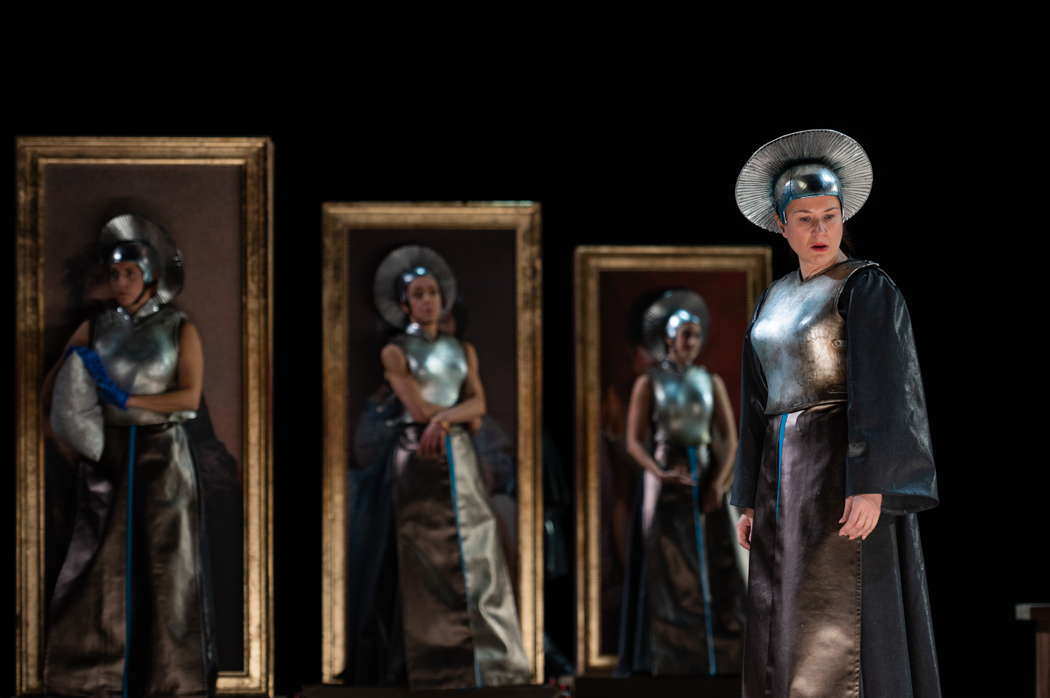
Ekaterina Gubanova as Mère Marie in Opera di Roma's production of Poulenc's Dialogues des Carmelites. Photo © 2022 Fabrizio Sansoni
Finally, in the female group, Emöke Baráth, a Hungarian soprano known mainly for coloratura roles in baroque operas, is a lively Soeur Constance de Saint-Denis.
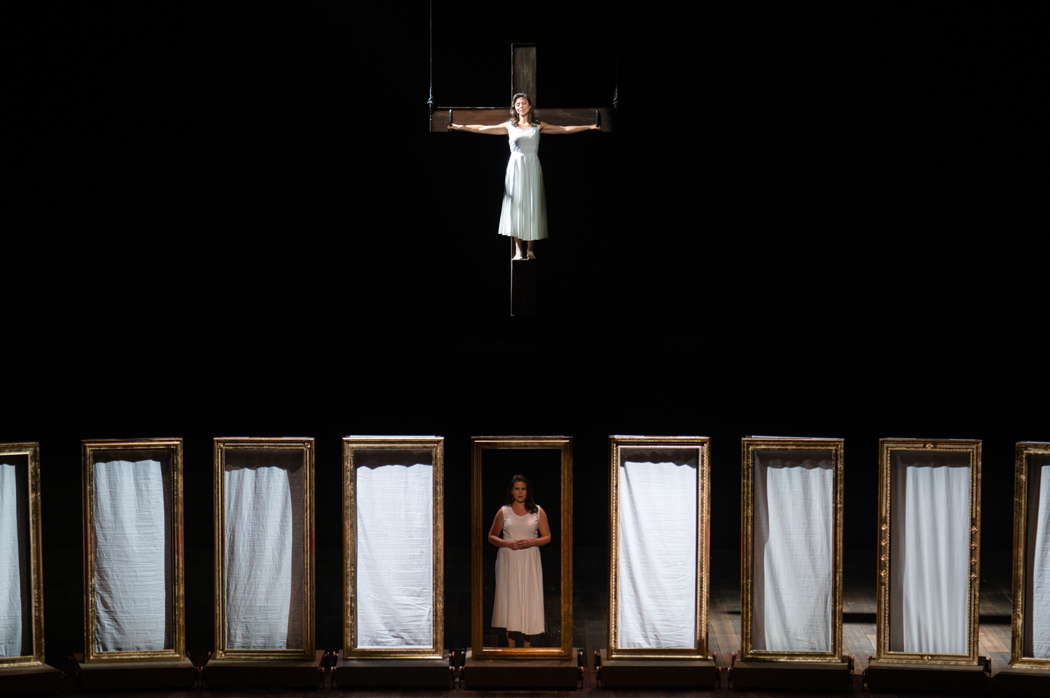
Corinne Winters as Blanche and Emöke Baráth as Soeur Constance in Opera di Roma's production of Poulenc's Dialogues des Carmelites. Photo © 2022 Fabrizio Sansoni
In the men's roles, Jean-François Lapointe as the Marquis de la Force and Bogdan Volkov as the Chevalier de la Force stand out.
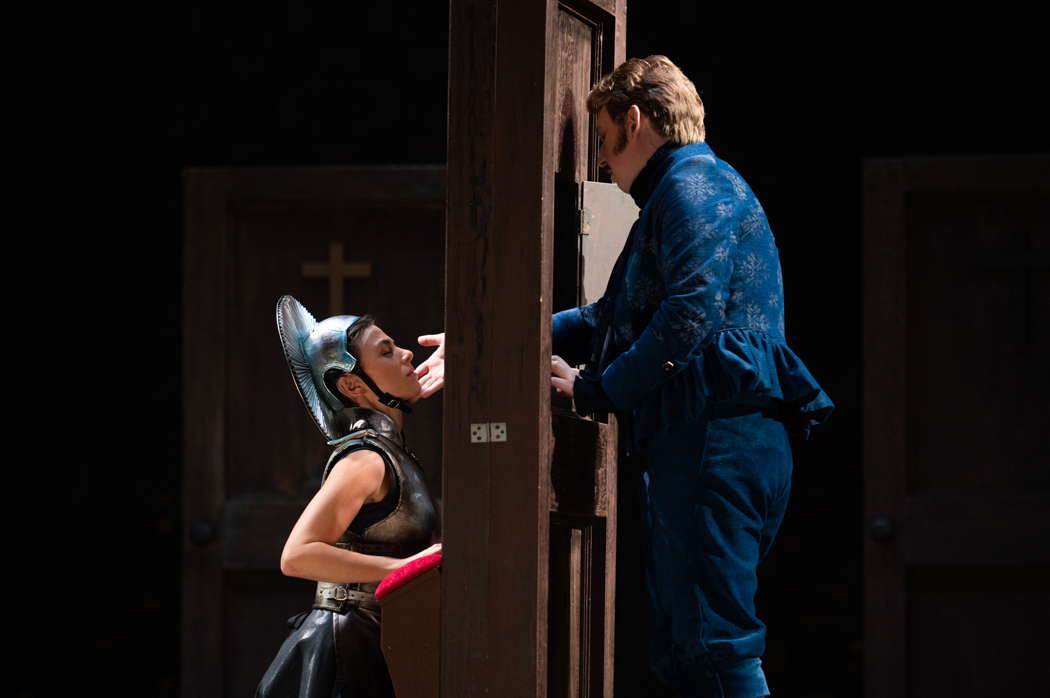
Corinne Winters as Blanche and Bogdan Volkov as the Chevalier de la Force in Opera di Roma's production of Poulenc's Dialogues des Carmelites. Photo © 2022 Fabrizio Sansoni
The cast is completed by Krystian Adam (L'Aumônier du Carmel), Alessio Verna (Le Geôlier and second Commissaire), William Morgan (first Commissaire) and Roberto Accurso (Officier). Also involved were several young talents from the latest editions of the Teatro dell'Opera 'Fabbrica' Young Artist Program: Irene Savignano (Mère Jeanne de l'Enfant-Jésus), Sara Rocchi (Soeur Mathilde) and Andrii Ganchuk (Thierry and Javelinot). The chorus of the Teatro dell'Opera di Roma was prepared by Ciro Visco, who replaced Roberto Gabbiani who has directed it for the last twelve years, bringing it to an excellent level.
There were fifteen minutes of applause and ovations.
Copyright © 29 November 2022
Giuseppe Pennisi,
Rome, Italy

CLASSICAL MUSIC ARTICLES ABOUT ROME


